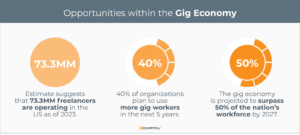
Understanding the Gig Economy - Challenges & Opportunities for Staffing Agencies
Content
The rise of the gig economy represents a significant shift in how people approach work, emphasizing the appeal of flexible arrangements and alternative employment options. The projected increase of gig staffing in the USA, estimated to be 73.3 million in 2023 and expected to reach 86.5 million by 2027, highlights the continued growth and significance of the gig economy. This trend underscores the appeal of freelancing as a viable and flexible employment option for individuals seeking more autonomy and companies wanting workforce scalability and flexibility. For staffing agencies, gig staffing represents challenges and opportunities in a burgeoning market that must be explored and understood.
This blog post looks at the trends, challenges, opportunities, and financial structure staffing agencies should consider to capitalize on the growth of gig staffing effectively.
The growing trend of gig staffing
The rise of the gig economy was propelled by the widespread adoption of technology, coinciding with the impacts of the Great Recession in 2008 and 2009. During this period, people facing unemployment or seeking additional income found engaging in small-scale “gigs” convenient. Today, gig staffing is growing three times faster than the total US workforce.
Here’s a brief overview of the significant milestones achieved by the gig economy:
- From 2010 to 2020, the proportion of workers engaged in gig staffing in the United States increased by 15%.
- In 2018, the population of gig workers surged to 14.9 million, a significant increase from 12.9 million in 2017 and 10.5 million in 2016.
- Before the pandemic, approximately 57.3 million individuals, roughly 36% of the American workforce, were actively involved in gig staffing.
- In 2020, gig staffing witnessed 33% growth, expanding 8.25 times faster than the overall US economy. Freelancers in the United States contributed $1.21 trillion to the US economy.
- The current estimate suggests that 73.3 million freelancers are operating in the United States as of 2023, with an anticipated increase to 76.4 million in 2024.
Projected forecasts indicate that gig staffing will expand to encompass 50% of the economy by the year 2027.
Challenges of the gig economy for staffing agencies
As gig staffing grows, it raises concerns, such as potential labor regulations and protection challenges. Policymakers and businesses are placing a growing emphasis on balancing flexibility and benefits for employers and workers, emphasizing the importance of fair labor practices, social security, and benefits for gig workers. Staffing agencies must stay abreast of the challenges in regulating the gig economy. Monitoring emerging policies and regulations governing the administration of gig staffing will help to ensure compliance with legal requirements and avoid potential legal consequences. By staying informed of these developments, staffing agencies can adapt their practices and policies to safeguard their reputation and minimize legal risks.
These challenges can be a competitive advantage for staffing agencies that understand the complexities of managing gig staffing. By developing expertise in the gig economy and adjusting their organization to become more efficient in this niche market, these agencies can position themselves for success.
Opportunities for staffing agencies
As we approach the new year, economic uncertainty stands out as a significant challenge for many companies to manage. However, this represents great opportunities for staffing agencies with an established pool of gig workers. These agencies are uniquely able to quickly adapt to client companies’ evolving staffing needs, responding to changing market demands and business cycles. The adaptability of gig staffing offers clients an effective way to avoid the costs and inefficiencies associated with maintaining a fixed workforce during periods of low demand.
Staffing agencies play a critical role in connecting businesses with skilled freelance talent, enabling their clients to manage various challenges, including:
Fluctuating demand: Consumer spending has kept the US economy afloat for the past few years. However, reduced savings and high food prices, worsened by the effects of inflation, will act as dampeners. Accurately forecasting demand and planning staffing requirements is anyone’s best guess as we head into a new year.
Project-based requirements: Many businesses often undertake short-term projects that require specialized skills and expertise not readily available in their existing workforce.
Seasonal variation: Industries that experience seasonal fluctuations in demand are challenged to effectively manage their resources and maintain optimal staffing levels throughout the year.
Specialized expertise: Companies often require specialized expertise to contribute knowledge and skills to complex projects, foster innovation, ensure high-quality output, and much more. The long-term commitment and costs of retaining these skills and knowledge as full-time employees can be excessive.
Businesses that adopt a flexible workforce with gig staffing can enhance their operational agility, efficiency, and adaptability to better meet changing market demands and business cycles. Staffing agencies that proactively address these considerations can position themselves as indispensable facilitators in the gig economy and offer unparalleled support, such as:
- Gig economy intelligence to assist client companies in connecting with highly skilled talent.
- Finding freelancers their next gig.
- Connecting gig workers to a regular work environment with supporting resources.
- HR support to assist freelancers with accounting and tax preparations.
- Dedicated human support offering personalized assistance instead of automated support from an app.
- Employment intelligence to assist freelancers in making informed career decisions.
Staffing agencies that enhance their knowledge of gig staffing and leverage expertise will be better positioned to meet the growing demand for support from freelancers and clients. However, having this expertise is only half the battle. Having a flexible financial structure to adapt to rapid changes in specialized workforce demand is equally as critical for staffing agencies to succeed as champions of gig staffing.
Establishing a flexible financial structure for staffing agencies
Staffing agencies that cultivate and manage gig staffing require financial flexibility to support a fluctuating labor pool. Rapidly changing payroll burdens can strain staffing agencies’ financial structures. However, specialized alternative lenders offer solutions to address this challenge. These lenders offer easy-to-attain payroll funding options specifically designed to maximize cash flow and increase access to working capital. With these streamlined options, agencies can establish a flexible financial structure to align their business financing with customer demand, frequent changes in gig staffing, and overall payroll burdens.
When working with a reputable alternative lender experienced in the staffing industry, the processes of qualification and onboarding are quick and efficient. Customizable contract terms are designed to meet your requirements, while minimal loan covenants provide maximum autonomy and flexibility to direct funds as needed. But, even more beneficial attributes are realized when partnering with the right lender.
The best alternative lenders for the staffing industry possess unique expertise and can address specific needs more efficiently than traditional banks. Leveraging decades of knowledge about the staffing industry, these specialty lenders offer valuable insights to help clients make better-informed financial decisions and provide creative solutions tailored to their specific needs.
Conclusion
Unprecedented influences reshape employment dynamics in ways unmatched before the Great Recession. The demand for flexible work options among workers and the necessity for scalable skilled labor among companies fuel the exponential growth of gig staffing. Presently, the gig economy is expanding three times faster than the overall US workforce.
Staffing firms that comprehend the dynamics of gig staffing and adapt their operations to connect businesses with skilled freelance talent will secure a competitive edge in this rapidly expanding staffing sector. Such agencies require a flexible financial structure that accommodates swift fluctuations in payroll obligations. Choosing a reputable and seasoned lender can optimize cash flow efficiencies, enhance access to working capital, and provide specialized guidance. These attributes help to establish the financial resilience needed to participate in the gig economy as it continues a projected path to encompass 50% of the nation’s workforce by 2027.
Staffing companies that understand gig staffing can adjust their organization and position themselves to profit from the increasing demand for a flexible and contingent workforce.
Key Takeaways
- Today, gig staffing is growing three times faster than the total US workforce.
- Current estimates suggest that 73.3 million freelancers operate in the United States as of 2023, with an anticipated increase to 76.4 million in 2024.
- Projected forecasts indicate that gig staffing will expand to encompass 50% of the economy by 2027.
- This represents challenges and opportunities that, if staffing agencies explore and understand, can help to develop competitive advantages in a burgeoning market.
- Staffing agencies that work with reputable and experienced alternative lenders can attain the financial flexibility needed to support gig staffing.
ABOUT eCapital
Since 2006, eCapital has been on a mission to change the way small to medium sized businesses access the funding they need to reach their goals. We know that to survive and thrive, businesses need financial flexibility to quickly respond to challenges and take advantage of opportunities, all in real time. Companies today need innovation guided by experience to unlock the potential of their assets to give better, faster access to the capital they require.
We’ve answered the call and have built a team of over 600 experts in asset evaluation, batch processing, customer support and fintech solutions. Together, we have created a funding model that features rapid approvals and processing, 24/7 access to funds and the freedom to use the money wherever and whenever it’s needed. This is the future of business funding, and it’s available today, at eCapital.


